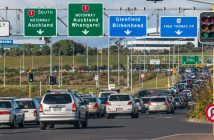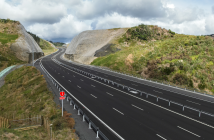There are four ways to fund transport and other infrastructure and with the end of petrol tax increases it is now time we explored the other three

So says Stephen Selwood Chief Executive of Infrastructure New Zealand, who outlined the following options.
“One, we tax people or businesses and use the revenue to deliver or subsidise investment.
“Two, users pay – the most familiar options are tolls and public transport fares.
“Three, other beneficiaries pay.”
Selwood says development levies charged on new homes to pay for the supporting infrastructure is an obvious example, but any tool which captures land value increases or wider economic benefits is beneficiary pays.
“Fourth and finally, infrastructure providers can sell one asset to invest in another.”
He says there are “lots of ways” to finance investment, including through loans, bonds and PPPs, but there are no other ways to fund infrastructure other than these four options.
However, regardless of the form of finance, debt must be repaid from some combination of taxes, charges, value capture or asset sales.
“The good news is that we’ve only really explored the first,” Selwood adds.
He argues that petrol taxes, road user charges, rates and other taxes which go into the transport fund to pay for investment have now been exhausted and there is little public support to go further.
“While general taxes which have driven the government’s $5.5 billion surplus can and should be directed into infrastructure, it is time we looked much more seriously at more efficient alternatives,” Selwood believes.
“Comprehensive, dynamic road tolling needs a clear path to implementation.
“The faster the uptake on electric vehicles, the sooner road pricing will become necessary.
“The public needs to know when and understand why road pricing is required.”
Those who benefit from increased property values should also pay their share, Selwood insists.
“The shift to compact, public transport-oriented development has enriched many property owners and pushed the less wealthy to the periphery of cities where they are more car dependent and more exposed to road taxes.
“The Auckland Council Chief Economist has recently estimated that rapid transit has increased property prices near central Auckland stations by up to 20 per cent – that’s $200,000 of value on a million-dollar home transferred to a lucky property owner but paid for by all ratepayers and motorists.
“It seems fair that these beneficiaries share the cost in some way.
Asset sales are the final option.
“All city councils across New Zealand own assets,” Selwood notes.
“Many of those assets are providing little return when the funds could be better invested in new infrastructure to support growth.”
Selwood believes public opposition would reduce if the benefits are obvious for all to see.
“A simple ballot can be used to depoliticise this debate, offering residents the choice between retaining ownership of an existing asset or investing in a better alternative.”
“Ultimately, Selwood says, “We need to stop strangling growth by underinvesting in infrastructure.
“People will pay if they experience the benefit, but we need to give them the choice.”




